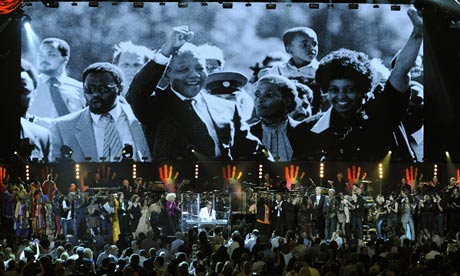
Among the challengers hoping to keep the X Factor winner Matt Cardle from topping the charts last Christmas were a new recording of John Cage's "4'33" and "Liar Liar" by Captain Ska. The first was the work of a group calling themselves Cage Against the Machine, who were trying to replicate the success of 2009's campaign to make Rage Against the Machine's "Killing in the Name" Christmas No 1, ahead of that year's X Factor winner. "Liar Liar" was an infectious synth-reggae attack on the coalition government's comprehensive spending review. In the event, neither even made it into the Top 40; and neither makes it into Dorian Lynskey's new history of protest songs. Cage's composition isn't a song, of course, though its four and a half minutes of silence can be an eloquent form of protest; and "Liar Liar" is either too slight to be included, or was released too late.
33 Revolutions Per Minute is organised like a giant compilation album or homemade mixtape or iPod playlist: each of its 33 chapters is named for a song, from Billie Holiday's "Strange Fruit" to Green Day's "American Idiot", via the work of, among others, Woody Guthrie, Bob Dylan, Nina Simone, James Brown, Gil Scott-Heron, Stevie Wonder, the Clash, Carl Bean, the Dead Kennedys, Crass, the Special AKA, Billy Bragg, REM, Public Enemy and Rage Against the Machine. Lynskey places their music in the context of America's union movement, civil rights, opposition to the Vietnam war, black power, gay rights, opposition to Reagan and Thatcher, the Falklands war, CND, the miners' strike, the anti-apartheid movement, rave culture and opposition to the war in Iraq. It's quite an undertaking.
"For reasons of space," Lynskey says, "I have limited my focus to western pop music." That "western" implies British and American seems to go without saying: there's no room for Deutschpunk or Fabrizio de André. There is a brief and slightly awkward diversion in the mid-1970s, however, with three chapters on the music of Chilean activist-songwriter Victor Jara (who disparaged "the commercialisation of so-called 'protest music'" in the United States), Fela Kuti and Lee "Scratch" Perry, and a quick run through the postwar political histories of Chile, Nigeria and Jamaica. Perhaps unsurprisingly, considering that Lynskey's a music journalist, 33 Revolutions Per Minute is better as a history of pop music than as political history.
A pattern emerges over the course of the book, as musician after musician appears with the hope that he – occasionally she, but most of Lynskey's protest singers are men – can change the world, tries, fails and retreats into disillusionment, having made a few great songs along the way. The book itself follows a similar trajectory. "I began this book intending to write a history of a still-vital form of music," Lynskey says in the epilogue. "I finished it wondering if I had instead composed a eulogy." The reason for the decline of the genre "lies as much with listeners as with artists", and is related to a "waning faith in hands-on protest… although the wave of British tuition fee protests in late 2010 marked a welcome and surprising resurgence".
A book about topical songs was always going to run the risk of being out of date by the time it came to be published. The uprisings in north Africa would be beyond its remit but Lynskey should be cheered by the occupation of the state Capitol building in Madison, Wisconsin, where they've been singing the O'Jays' "Love Train" and Sister Sledge's "We Are Family", a song that Lynskey says was "politicised after the fact", since its celebration of "the tight bond between the group's four sisters... resonated with black, gay and feminist listeners" – and now with public-sector workers fighting to retain their collective bargaining rights.
Old protest songs have been making a comeback elsewhere, too. Anti-Berlusconi demonstrators in Italy last month took to the streets to the sound of Patti Smith's "People Have the Power"; the British students protesting in London last year sang "Tories, Tories will tear us apart again" to the tune of Joy Division's "Love Will Tear Us Apart". Putting new words to old tunes has long been standard practice for protest songs; that way they're easier to sing along to. And it makes sense that opposition to the Tory attack on the welfare state should look to the Thatcher era; "Liar Liar" is a form of early-80s revival, too. As for truly new protest songs, it may well be the case that there aren't any being made; but then again it may just be that broadsheet journalists haven't heard them yet.
In the meantime, we still have the old ones to listen to. And the best thing about Lynskey's book is that it will send you back – or for the first time – to an array of extraordinary songs, from Nina Simone's nerve-tingling "Mississippi Goddam" to the full-on assault of Crass's Falklands-inspired and Thatcher-directed "How Does It Feel to Be the Mother of a Thousand Dead".

